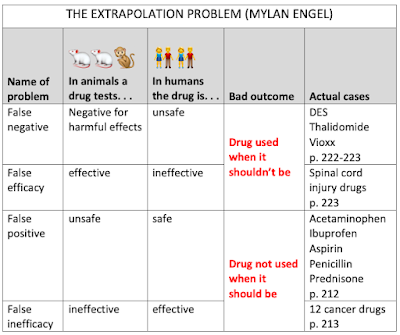AGENDA
- What's going on inside labs? finish presentation
- How are labs regulated? The animal welfare act
- Mylan Engel's argument against animal research
Presenters talked about "Ethics Committees"
- "Ethics Committees" = IACUCs = Institutional Animal Care and Use Committees
- We have animal research at SMU so we have to have an IACUC
- required by the Animal Welfare Act (federal law)
- covers animals such as hamsters, guinea pigs, rabbits, cats, dogs, monkeys
- excluded: birds, mice, rats, cold-blooded animals
- regulates basic care – size of cages, food, housing, "exercise for dogs," environment that "promotes the psychological well-being of primates"
- requires pain and distress be minimized as much as possible
- but there can be exceptions based on "research protocol"; e.g. the Harlow type research and the stress test discussed in the presentation
- vets must supervise painful research
- AWA doesn't put limits on research goals
- life saving science vs. new cosmetic surgery techniques
- requires oversight by IACUCs
- members: must include one vet, one person from community who represents animal interests
- they evaluate proposals and protocols
- they do inspections and issue reports (APHIS website)
Mylan Engel, "The Commonsense Case against Animal Experimentation"
- Argument is against all animal experimentation but he focuses on "testing" drugs and vaccines
- wants to avoid controversial assumptions like Singer's and Regan's
- Contemporary case: testing covid vaccines on monkeys
Engel's Argument
- It is wrong to intentionally harm* conscious sentient animals for no good reason. (common sense). Therefore
- It is wrong to intentionally perform harmful* experiments on conscious sentient animals for no good reason. (obvious!)
- Animal research is done for no good reason because it can't be extrapolated to human beings. Therefore
- It is wrong to do animal research.
*We'll assume (a) harming encompasses (b) inflicting suffering and (c) killing, but Engel makes three separate arguments.
Premise 3: The Extrapolation problem
- Dogs and chocolate
- LD50 example
- "Why should anyone care how much of X proves lethal to 50 percent of rat subjects? This idiosyncratic information has no relevance to human health and well being It is no more useful than knowing whether the number of blades of grass in your front yard is odd or even." (Engel p. 220)
- Example where it seems useful: testing of batches of botox. LD50 does tells you how strong the batch is. If stronger than usual, then not used.
Discussion
- Is he saying scientists have never learned anything from animal experiments? What about Salk's polio research? What about current covid research?
- Can scientists do their research better, so as to overcome the extrapolation problem? What does Carbone say?
- What about animal research that doesn't involve testing and extrapolation?
- Grow human tissue in vitro, use it to study diseases and drugs
- Use synthetic substitutes
- Use computer models
- Go directly to testing on human volunteers, using microdosing
Discussion
- Volunteers for covid vaccine trials were available before vaccine candidates had been tested in monkeys. Is it ethical to use them?



